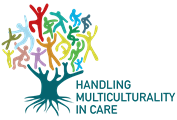Project summary
Scientific background
Innovative aspects
Process of MultiCult
Results
Project impacts
Project impacts
1. Care professionals in the participating care organisations
- Better psychological work environment
- Increased work satisfaction
- Experiencing a competence boost
- Better understanding of differences in values and the importance of this
2 .Teachers in the participating educational institutions
- Gain insight in a new focus area
- Gain experience with new teaching methods
Implications for participating organizations:
1. Care organisations
- Generally improved cooperation
- More efficient use of care resources
- Increased satisfaction with care efforts
- Increased consensus on interpretation and compliance strategies and principles
2. Educational institutions
- Experience with the problem area
- Experience with new method of teaching
- New courses
The significance for the target groups in general:
Caregivers:
The same as for the participating care workers
Teachers:
The same meaning as for the participating teachers
Implications for other stakeholders:
1. Residents at care centres.
- Better reconciliation of employees' attitudes
- Higher quality in care
- Better adapted care in relation to the resident / citizen needs
2. Caregivers
- Will experience a greater consensus on care efforts
- Better adapted care in relation to the relatives
Short term impacts
- That at least 30 nursing homes or other organizations have used some of the teaching material developed in this project. The project steering committee will count the users of the teaching material in each country
- That the VET-system has shown interest in the teaching material and methods of the project.
- The project steering committee will keep track of alterations in the VET system on this specific area and will document other stakeholders’ contact and interest in the teaching material and methods
- The participating nursing staff experience that they have got tools for handling their daily work better
- At the end of the project a small questionary will be conducted on caregivers experience with the teaching material
- That the leaders experience better equiped care giveres when handling a multicultural workplace.
- At the end of the project a small interview will be conducted with the leaders in the participating institutions about their experience with the project, and on this subject
Impact on following levels
The desired impact at the following levels:
Local level:
- The participating care organization will be better at dealing with cultural differences in daily life.
- The surrounding care organizations show interest and want to learn more about the concept.
At the regional level:
- The project provides inspiration and basis for new ways of thinking about care
- Initiatives to discuss new ways to integrate different value systems within the same organization will be launched
- The project provides inspiration and experience with new teaching methods
- Training courses based on MultiCul will be offered
At the national level:
- The basic care education will be changed to include the principles of MultiCul
- The pedagogical principles (especially in retraining) is changed according to experience gained in the project
The partnership has already made agreements with several other partners in other countries among others Sweden and UK, who would like to partipate in the project, but couldn't get the formalities cleared before deadline.
Measuring the effects
Measuring the impact on participants:
- Small quantitative questionnaires
- Short-term group interviews e.g. in connection to training
Measuring the impact on the participating organizations:
- Small quantitative questionnaires
- Short-term group interviews e.g. in connection to training
- Interviews with management
Measuring the impact on other stakeholders:
- Observations of daily life
- Small group interviews
- Small surveys
Measurement of local interest in the project:
- Registration of inquiries about the project (or click on website and Facebook likes)
Measurement at the regional level:
- Registration of new projects based on the principles of MultiCul
Measurement at National level:
- Changes in the educational curriculum as a result of the project
The operational objectives of the project are:
- Caregivers have achieved new key competences in connection with
- discussions of value systems in relation to their current and future needs
- Employees perceive that they have been presented with new methods employees experience that opens their readiness to learn in the future
- To adjust and evaluate new teaching methods to support improvements in formal and informal vocational education and training systems
- In general, to be better to deal with cultural differences and create a greater readiness in relation to changes in the cultural maps on their job.
- Facilitating adjustment within the care sectors vocational training through the transfer of knowledge and experience.
- Improving the interaction between vocational training with learning in practice in different national contexts.
- Improve the effect in everyday work situations by putting together a curriculum with an interaction between workplace and school

